3定语从句
- 格式:docx
- 大小:21.55 KB
- 文档页数:8

定语从句(3)从句的本质从句的本质是:句子作成分/词类在简单句中,成分都是由单词或短语充当的:I know you.主语是I ;谓语是know ;宾语是youI enjoy reading novels.主语是I ;谓语是know ;宾语是reading novels(动宾短语)I know he is ill.主语是I ;谓语是know ;宾语是he is ill(句子)我们可以看出:最后的句子He is ill 是作了句子成分的,作宾语,因此可以叫它为“宾语从句”从另一个角度来说:这个句子相当于一个名词,因此可以叫做“名词性从句”That she finished reading an English novel surprised us all.上面的句子当中,句子She finished reading an English novel作了主语,因此叫“主语从句”,也相当于名词,还可以叫做“名词性从句”She finished reading an Englishnovel yesterday. She finished reading an Englishnovel at the age of 12.She finished reading an Englishnovel when she was 12.从上面的变化情况我们可以看出,从单词作成分,短语作成分到句子作成分,作的都是状语,因此从句叫“状语从句”,或叫“副词性从句”。
The little girl finished reading an English novel. The girl in school uniform finished reading an English novel.The girl who is 12 finished reading an English novel.从上面的变化情况我们可以看出,从单词作成分,短语作成分到句子作成分,作的都是定语,因此从句叫“定语从句”,或叫“形容词性从句”。




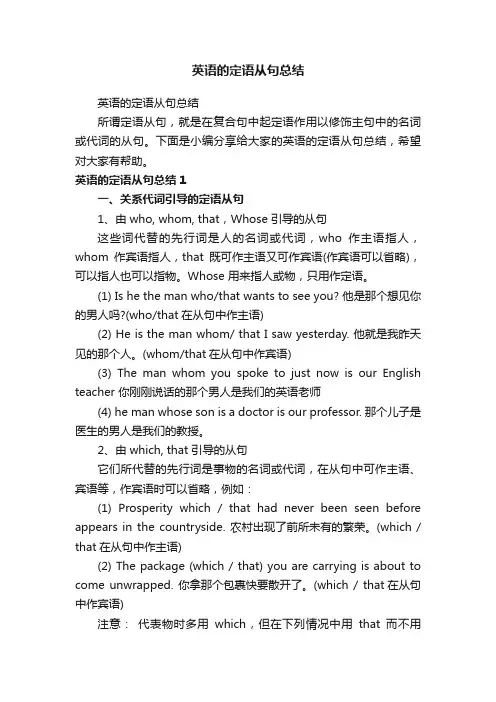
英语的定语从句总结英语的定语从句总结所谓定语从句,就是在复合句中起定语作用以修饰主句中的名词或代词的从句。
下面是小编分享给大家的英语的定语从句总结,希望对大家有帮助。
英语的定语从句总结1一、关系代词引导的定语从句1、由who, whom, that,Whose引导的从句这些词代替的先行词是人的名词或代词,who作主语指人,whom作宾语指人,that既可作主语又可作宾语(作宾语可以省略),可以指人也可以指物。
Whose 用来指人或物,只用作定语。
(1) Is he the man who/that wants to see you? 他是那个想见你的男人吗?(who/that在从句中作主语)(2) He is the man whom/ that I saw yesterday. 他就是我昨天见的那个人。
(whom/that在从句中作宾语)(3) The man whom you spoke to just now is our English teacher 你刚刚说话的那个男人是我们的英语老师(4) he man whose son is a doctor is our professor. 那个儿子是医生的男人是我们的教授。
2、由which, that引导的从句它们所代替的先行词是事物的名词或代词,在从句中可作主语、宾语等,作宾语时可以省略,例如:(1) Prosperity which / that had never been seen before appears in the countryside. 农村出现了前所未有的繁荣。
(which / that在从句中作主语)(2) The package (which / that) you are carrying is about to come unwrapped. 你拿那个包裹快要散开了。
(which / that在从句中作宾语)注意:代表物时多用which,但在下列情况中用that而不用which:a)先行词是anything, everything, nothing , none等不定代词时;b)先行词由every, any, all, some, no, little, few, much等修饰时,这时的that常被省略;c)先行词前有序数词或被形容词最高级修饰时;d)先行词中既有人又有物时;e)整个句中前面已有which,who,that时;f)当先行词为物并作表语时;g)先行词为one时;h)先行词同时又被the only,the very,the same修饰时;二、关系副词引导的定语从句1、when指时间在定语从句中做时间状语也可做连接词用I still remember the day when I first came to the school.2、where指地点在定语从句中做地点状语 Shanghai is the city where I was born.3、why指原因在定语从句中做原因状语,用在reason 后面。
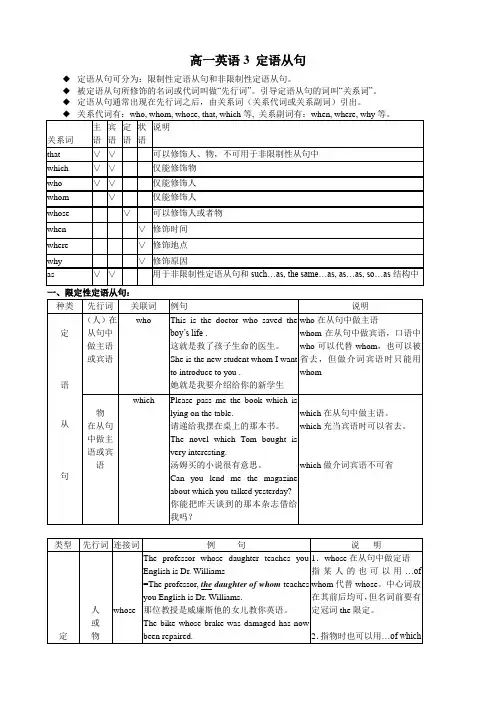
高一英语3 定语从句◆定语从句可分为:限制性定语从句和非限制性定语从句。
◆被定语从句所修饰的名词或代词叫做“先行词”。
引导定语从句的词叫“关系词”。
◆定语从句通常出现在先行词之后,由关系词(关系代词或关系副词)引出。
一、限定性定语从句:注:先行词是time, minute, moment, next time很少用关系副词when,可用that 但通常省去。
二、关系副词引导的定语从句关系副词可代替的先行词是时间、地点或理由的名词,在从句中作状语。
关系副词when, where, why的含义相当于"介词+ which"结构There are occasions when(on which)one must yield.任何人都有不得不屈服的时候。
Beijing is the place where(in which)I was born.北京是我的出生地。
Is this the reason why (for which)he refused our offer?这就是他拒绝我们帮助他的理由吗?三、如何判断关系代词与关系副词比较:This is the mountain village __________ I stayed last year.This is the mountain village __________ I visited last year.比较: I'll never forget the days ____________ I worked together with you.I’ll never forget the days ____________ I spent in the countryside.1. The house, _____ was destroyed in the terrible fire, has been repaired.A. the roof of whichB. which roofC. its roofD. the roof2. Can you lend me the novel _____ the other day?A. that you talkedB. you talked about itC. which you talked withD. you talked about3. The matter _____ you were arguing about last night has been settled.A. thatB. whatC. whyD. for which4. They talked for about an hour of things and persons _____ they remembered in the school.A. whichB. thatC. whoD. whom5. Who _____ has common sense(常识)will do such a thing?A. whichB. whoC. whomD. that6. All the apples _____ fell down were eaten by the pigs.A. thatB. thoseC. whichD. what7. They asked him to tell them everything _____ he saw at the front.A. whatB. thatC. whichD. where8. I’ll tell you _____ he told me last night.A. all whichB. all whatC. that allD. all9. A child _____ parents are dead is called an orphan.A. whoB. who’sC. whoseD. which10. Is this the museum _____ you visited the other day?A. thatB. whereC. in whichD. the one11. Is this museum _____ some German friends visited last Wednesday?A. thatB. whereC. in whichD. the one12. --- How do you like the book?--- It’s quite different from _____ I read last month.A. thatB. whichC. the oneD. the one what13. The train _____ she was traveling was late.A. whichB. whereC. on whichD. in that14. He has lost the key to the drawer _____ the papers are kept.A. whereB. on whichC. under whichD. which15. Antarctic _____ we know very little is covered with thick ice all the year round.A. whichB. whereC. thatD. about which16. He often helps the students _____ he thinks are not quick at their studies.A. whomB. whoC. whenD. because17. He was born in the year _____ the Anti-Japanese War broke out.A. whichB. whenC. on whichD. during which18. Mr. Crossett will never forget the day _____ he spent with his various students.A. whenB. whichC. during whichD. on which19. This is just the place _____ I am longing to visit these years.A. thatB. whereC. in whichD. to where20. The hotel _____ during our holidays stands by the seaside.A. we stayed atB. where we stayed atC. we stayedD. in that we stayed21. He has to work on Sundays, _____ he does not like.A. and whichB. whichC. and whenD. when22. Is that the reason _____ you are in favor of the proposal?A. whichB. whatC. whyD. for that23. Some of the roads were flooded, _____ made our journey more difficult.A. whichB. itC. whatD. that24. He must be from Africa, _____ can be seen from his skin.A. thatB. asC. whoD. what25. He has two sons, _____ work as chemists.A. two of whomB. both of whomC. both of whichD. all of whom26. The buses, _____ were already full, were surrounded by an angry crowd.A. most of thatB. which mostC. most of whichD. that most27. My glasses, _____ I was like a blind man, fell to the ground and broke.A. whichB. with whichC. without whichD. that28. Mr. Wu, _____ everybody likes, is going to give us a talk on chemistry.A. whomB. thatC. whichD. /29. This is Mr. Smith, _____ I think has something interesting to tell us.A. whoB. whomC. thatD. /30. She is the only one of the students who ____ praised by the teacher.A. isB. areC. hasD. have31. She is one of the few girls who ____ passed the examination.A. wasB. wereC. hasD. have32. I, _____ your good friend, will try my best to help you out.A. who isB. who amC. that isD. what is33. He is a man of great experience, _____ much can be learned.A. whoB. thatC. from whichD. from whom34. It was such a serious mistake, _____ caused by carelessness.A. which I think wasB. which I think it wasC. I think which wasD. I think which it was35. The general at last got a chance to visit the village ___ he used to fight, _____he had been dreaming of for years.A. that/whichB. where/thatC. in which/whatD. where/which1-5 ADABD 6-10 ABDCA 11-15 DCCAD 16-20 BBBAA 21-25 BCABB 26-30 CCAAA 31-35 CBDAD。
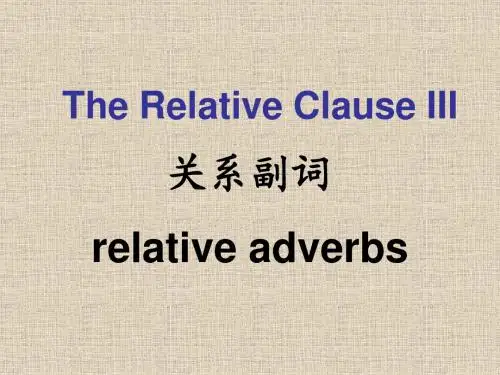
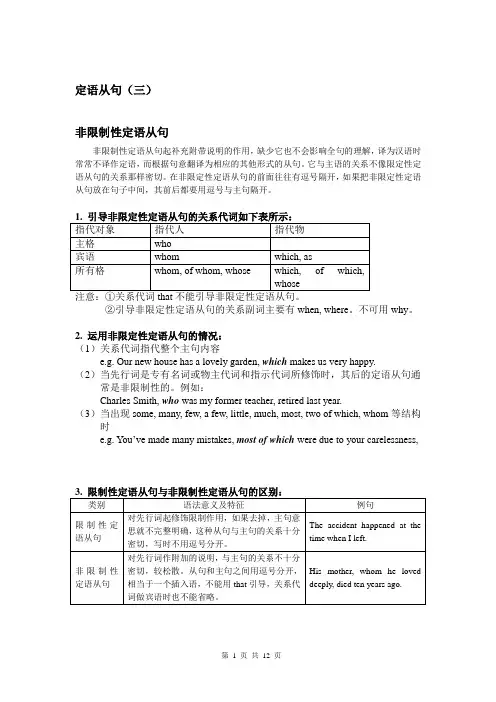
定语从句(三)非限制性定语从句非限制性定语从句起补充附带说明的作用,缺少它也不会影响全句的理解,译为汉语时常常不译作定语,而根据句意翻译为相应的其他形式的从句。
它与主语的关系不像限定性定语从句的关系那样密切。
在非限定性定语从句的前面往往有逗号隔开,如果把非限定性定语从句放在句子中间,其前后都要用逗号与主句隔开。
②引导非限定性定语从句的关系副词主要有when, where。
不可用why。
2. 运用非限定性定语从句的情况:(1)关系代词指代整个主句内容e.g. Our new house has a lovely garden, which makes us very happy.(2)当先行词是专有名词或物主代词和指示代词所修饰时,其后的定语从句通常是非限制性的。
例如:Charles Smith, who was my former teacher, retired last year.(3)当出现some, many, few, a few, little, much, most, two of which, whom等结构时e.g. You’ve made many mistakes, most of which were due to your carelessness,非限制性定语从句主要在以下方面不同于限制性定语从句:⑴非限制性定语从句和主句的关系不十分密切,它不是对先行词进行修饰或确定,只是对先行词作些附加的说明。
专有名词通常被非限制性定语从句所修饰。
例如:地名,人名,国家名等。
⑵非限制性定语从句不是先行词必不可少的修饰语,因此如果去掉从句,主句的意思仍然清楚。
⑶从句和主句之间往往用逗号分开,翻译时复合句通常译成两句话。
⑷与限制性定语从句一样,非限制性定语从句也可用关系代词who, which, whom, whose, as 和关系副词when, where, why 引导。
that不引导非限制性定语从句。
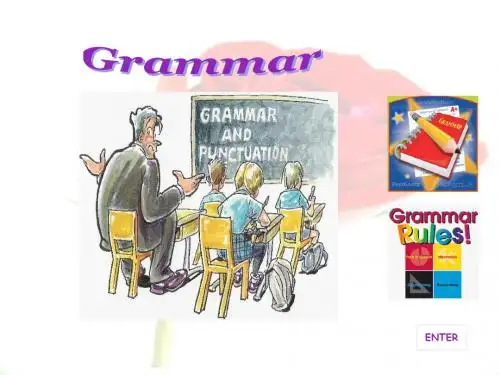
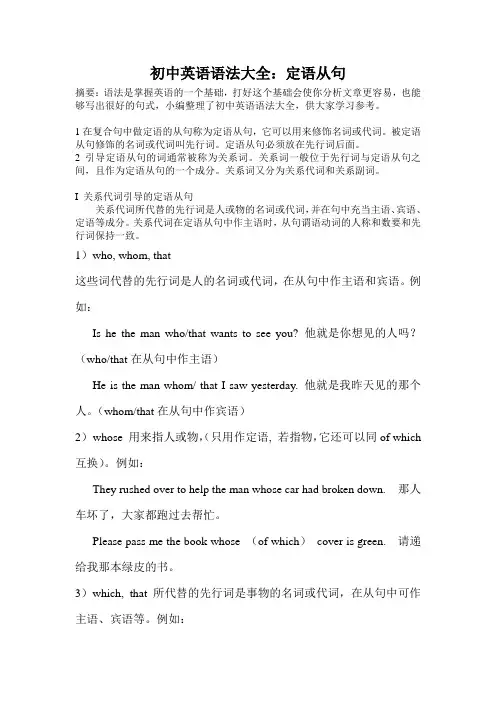
初中英语语法大全:定语从句摘要:语法是掌握英语的一个基础,打好这个基础会使你分析文章更容易,也能够写出很好的句式,小编整理了初中英语语法大全,供大家学习参考。
1在复合句中做定语的从句称为定语从句,它可以用来修饰名词或代词。
被定语从句修饰的名词或代词叫先行词。
定语从句必须放在先行词后面。
2引导定语从句的词通常被称为关系词。
关系词一般位于先行词与定语从句之间,且作为定语从句的一个成分。
关系词又分为关系代词和关系副词。
I 关系代词引导的定语从句关系代词所代替的先行词是人或物的名词或代词,并在句中充当主语、宾语、定语等成分。
关系代词在定语从句中作主语时,从句谓语动词的人称和数要和先行词保持一致。
1)who, whom, that这些词代替的先行词是人的名词或代词,在从句中作主语和宾语。
例如:Is he the man who/that wants to see you? 他就是你想见的人吗?(who/that在从句中作主语)He is the man whom/ that I saw yesterday. 他就是我昨天见的那个人。
(whom/that在从句中作宾语)2)whose 用来指人或物,(只用作定语, 若指物,它还可以同of which互换)。
例如:They rushed over to help the man whose car had broken down.那人车坏了,大家都跑过去帮忙。
Please pass me the book whose (of which)cover is green.请递给我那本绿皮的书。
3)which, that所代替的先行词是事物的名词或代词,在从句中可作主语、宾语等。
例如:A prosperity which / that had never been seen before appears in the countryside.农村出现了前所未有的繁荣。
初识定语从句一、了解定语从句及相关术语1. 定语从句:修饰一个名词或代词的从句称为定语从句,一般紧跟在它所修饰的先行词后面,相当于形容词在句中作定语。
2. 先行词:被修饰的名词或代词叫先行词。
3. 关系词:引导定语从句的关联词称为关系词。
关系词有关系代词和关系副词。
关系代词有that,which,who,whom,whose,as等;关系副词有where,when,why等。
关系词有三个作用:1.连接作用(即引导定语从句)。
2.代替先行词3在定语从句的担当一个成分。
He is the man who I want to see.他就是我想见的人。
先行词关系词定语从句二、掌握关系代词及其作用最常用的关系代词是who, whom, whose, that,which和as。
关系代词同时起了两个作用。
它们可以像别的代词一样,可以代表一个名词,在定语从句中用作主语或宾语,同时,它们又起到了连词的作用,把主句和从句连接起来。
1. who指人,在定语从句中一般做主语。
如:Do you know the man who is speaking to your father? 你认识和你爸爸讲话的那个人吗?(定语从句修饰先行词the man,who在定语从句中作is speaking的主语)This is the stranger who helped us yesterday. 这是昨天帮助我们的那个陌生人。
She is the girl who works hard at maths. 她就是那个努力学习数学的女孩。
2. whom指人,在定语从句中作宾语。
在口语或非正式文体中,whom可以省略。
如:He is the man (whom) we just talked about. 他就是我们刚才谈论的那个人。
The boy (whom) we met in the street yesterday is my classmate.我们昨天在大街上遇到的那个男孩是我的同学。
定语从句的用法归纳总结1定语从句定语从句是指作为句子的一部分,主要用来修饰名词或代词的从句,表示这个名词或代词所指的人或物。
它是由关系词和形容成分(名词、代词、副词及短语)构成的。
关系词也称为“连接词”、“关联词”(relative words),它有几十种,主要有:that,which,who,whom,whose,as,when,where,why等。
2定语从句的分类(1)根据关系词的用法可以分为定语从句和同位语从句两大类:定语从句:用关系词作句子成分,修饰主句中某个名词或代词,以及表示名词或代词所指的人或物。
同位语从句:用关系词引导的从句,句中某个名词或代词的意义由其后的从句来补充说明,以此来表达进一步的意思。
(2)根据句中关系词的所指数目可以分为两种:定语从句:句中关系词指代单数名词或代词同位语从句:句中关系词指代复数名词或代词3定语从句的用法(1)that引导的定语从句:that引导定语从句可以指代人或物,也可以指代抽象概念,如idea、fact等。
有时可以省略that引导的定语从句,但要注意that 引导的定语从句在口语中通常不省略。
(2)which引导的定语从句:which引导的定语从句通常只能指代物,而不能指代人,故不能用来替换who或whom,但可以替换that。
此外,在对话语言中,which 引导的定语从句可以指代人,而且一般不可以省略。
(3)whose引导的定语从句:whose引导的定语从句用以表示某人、某物或某事所属的所有者,常用来替换whoever和whatever,但不能用来替换they。
(4)when/where引导的定语从句:when/where引导的定语从句可以用来表示时间和地点,即问句中的时间和地点。
(5)as/than引导的定语从句:as/than引导的定语从句一般用来比较两个事物,故它们往往出现在类似“as…as”或“not as/so…as”这样的句型中。
定语从句I think that I am right.The man who is standing on the stage is a teacher.关系词:关系代词、关系副词一、关系代词指人:who / whom(宾语)/ that指物:that / which指......的:whose1、Jack lives here.Jack is my friend.Jack who / that lives here is my friend.2、They're looking for a missing boy.The missing boy is my brother.The missing boy who / that / whom they are looking for is my brother.The missing boy they are looking for is my brother.3、They're the birds.I fed the birds this morning.They're the birds that / which I fed this morning.They're the birds I fed this morning.4、whose代替his / her / my / your /its等1)She is a novelist.Her book won several prizes.She is a novelist, whose book won several prizes.2)He is an expert.We want his advice.He is an expert, we want whose advice. ×whose we want advice. ×whose advice we want. √3)This is the house.Its windows were broken.The windows of the house were broken.This is the house, whose windows were broken.This is the house, the windows of which were broken.This is the house, of which the windows were broken.用X代替任意名词:whose X = the X of which (whom) = of which (whom) the X 练习1:1. We are studying in a reading-room, the doors ________ are made of glass.A. of thatB. thatC. of whichD. which2. Recently I bought an ancient Chinese vase, ________ was very reasonable.A. which priceB. the price of whichC. its priceD. the price of whose3. The book, ________ is yellow, is mine.A. the cover of itB. the cover of whichC. whose the coverD. of which coverthat和which的区别:☆以下情况只能用that:1、当先行词为all / everything / anything / nothing / the one / little / much等或有人有物时,一般只用thatThis is all that I want to say.They talked for about an hour of things and persons that they remembered in the school.2、当先行词被all / any / every / no / some / little / much / the only / the very / the last / 序数词及最高级修饰时,一般只用thatYou can take home any / every book that you like.This is the best film that I have ever seen.☆以下情况只能用which:1、介词+ which2、非限制性定语从句中,逗号后面用which练习2:1. We talked about the books and writers ________ we knew.A. whichB. whoC. whomD. that2. This is the very book ________ I want of find.A. thatB. whichC. itD. with which3. The most important thing ________ we should pay attention to is the last part of the report ________ has beencapitalized.A. which, thatB. that, whichC. which, whichD. that, that二、介词+which结构和关系副词关系副词:when / where / why介词后面只能接which,不能接that1、I still remember the day.I first met her on the day.I still remember the day that / which I first met her on.I still remember the day on which I first met her.I still remember the day when I first met her.练习3:1. February is the only month ____ has fewer than 30 days.2. September 18, 1931 is the day ____ we'll never forget.3. I will never forget the day ____ I joined the Party.2、This is the city.I live in the city.This is the city that / which I live in.This is the city in which I live.This is the city where I live.练习4:1. I like to shop at stores ____ have products from different countries.2. I like to shop at stores ____ I can find products from different countries.3、the reason why结构Do you know the reason?He was late for the reason.Do you know the reason which he was late for?Do you know the reason for which he was late?Do you know the reason why he was late?三、介词+which / whom结构1、Stephen is the person.I work with the person.Stephen is the person whom I work with.Stephen is the person with whom I work.2、This is the pan.I boil the milk in the pan.This is the pan which I boil the milk in.This is the pan in which I boil the milk.练习5:1. Could you lend me the knife ____ I can cut it.2. The novel, ____ the film is based, is very moving.3. Do you have a telescope ____ we can study the sky.4. Please pass me the notebook ____ you found the lyrics.试比较:Is this factory the one we visited last year?Is this the factory which / that we visited last year?练习6:Is this book ____ you want to borrow?A. thatB. whichC. the oneD. \四、限制性定语从句与非限制性定语从句1、定义1)限制性定语从句:一般无逗号分隔,对先行词严格限制2)非限制性定语从句:一般有逗号分隔,对先行词做补充说明2、非限制性定语从句中的关系词1)非限制性定语从句中无that, why练习7:1. "Who Moved My Cheese?", ________ is a best - selling book, is written by Spencer Johnson.A. whichB. thatC. itD. what2. Mr. Wu, ________ everybody likes, is going to give us a talk on chemistry.A. whomB. thatC. whichD. /2)非限制性定语从句中关系词一律不准省略3、非限制性定语从句中的which(这一点)和as(正如)1)在非限制性定语从句中,which不仅可以替代名词或代词,还可以替代逗号前的一句话,译为“这一点”This is a shop, which sells PC.She married G. C., which surprised everyone.2)as也可以替代一句话,译为“正如”,常用于固定结构as is well known, as is known to all, as everybody knows,(众所周知)as is expected, as happened before, as has been pointed out,练习8:1. ________ is known to everyone, the moon travels round the earth once every month.A. ItB. AsC. ThatD. What2. Sometimes the earthquake is so violent that it can destroy the whole city, ________ happened in Tangshan, in1976.A. asB. thatC. whereD. like3. The writer has written quite a few books now, ________ his teachers and parents didn't expect.A. thatB. asC. of whichD. which4. ________ has been announced, we shall have our final exam next term.A. ThatB. AsC. ItD. What5. In one night, the city was completely destroyed by a terrible earthquake, ________ about 240 000 people died.A. whichB. whenC. in whichD. in that4、of which / whom结构:在非限制性定语从句中,下列词可以和of which / whom连用,表示比例关系:√each, some, any, several, many, much, a few, half, most, all√分数,百分数,数词及最高级等I bought many books, which are about English learning.two of which ..., half of which ..., most of which ..., some of which ..., none of which ...练习9:1. The old man has two sons, ________ is a soldier.A. one of whomB. both of themC. all of whomD. none of them2. New York is famous for its sky-scrapers, ________ has more than 100 storeys.A. the higher of themB. the highest of whichC. the highest of themD. some of which3. He has two sons, ________ work as chemists.A. two of whomB. both of whomC. both of whichD. all of whom5、think / say / believe型:1)Jack lives here.Jack is my friend.Jack who lives here is my friend.2)I think Jack lives here.Jack is my friend.Jack who I think lives here is my friend.练习10:1. He often helps the students ________ he thinks are not quick at their studies.A. whomB. whoC. whenD. because2. This is Mr. Smith, ________ I think has something interesting to tell us.A. whoB. whomC. thatD. /3. I will hire the man ________ they say is a good English speaker.A. whoB. thatC. whichD. whom6、the way当the way表示“......方式”时,可以用the way that / in which练习11:1. I don't like the way ____ you speak to her.A. \B. thatC. in whichD. All A, B and C2. Can you tell me the name of the factory ________ you paid a visit last week?A. whatB. whichC. to whichD. to that3. Didn't you see the man ________?A. I nodded just nowB. whom I nodded just nowC. I nodded to him just nowD. I nodded to just now4. In the dark street, there wasn't a single person ________ she could turn for help.A. thatB. whoC. from whomD. to whom定语从句专项练习题1. Nearly all the streets are in straight lines, ________ from east to west. Those ________ run from north to south are called avenues.A. running; thatB. run; whoC. running; whoD. run; that2. This is the case ________ he’s had all his money stolen.A. whenB. whereC. thatD. on which3. Mr. Smith will pay a visit to Beijing this autumn, ________ we will enjoy the Olympic Games in 2008.A. whereB. whenC. whichD. how4. The artist will not paint people or animals but he will paint anything________ .A. that the little girl asks himB. the little girl asks him toC. for the little girl to ask himD. what the little girl asks him5. —How did you get in touch with the travel agent, Robin?—Oh, that’s easy. I surfed the Internet and then called one _______ the telephone number is provided.A. whichB. in whichC. of whichD. whose6. October 15th is my birthday, ________ I will never forget.A. whenB. thatC. whatD. which7. The treatment will continue until the patient reaches the point ______ he can walk correctly and safely.A. whenB. whereC. whichD. whose8. There are several research centers in China ________ a certain disease called Bird Flu is being studied.A. whichB. whereC. whenD. what9. I hope that the little ________ I have been able to do does good to them all.A. whichB. whatC. thatD. when10. The time is not far away ________ modern communications will becomewidespread in China’s vast countryside.A. asB. whenC. untilD. before11. ________ is known to everybody, Taiwan is a part of China. We must unify it.A. ItB. AsC. WhichD. What12. I shall never forget the day ________ Shen Zhou V was launched, ________ has a great effect on my life.A. when, whichB. that, whichC. which, thatD. when, that13. The bread my wife makes is much better than ________ you can buy at a store.A. that whichB. one thatC. that of whichD. this of which14. There is no such place ________ you dream of in all this world.A. thatB. whatC. whichD. as15. The people, ________ had been damaged by the flood, were given help by the Red Cross.A. all whose homesB. all of whose homesC. all their homesD. all of their homes16. The humans are destroying nature day by day, ________ of course, will cause severe punishment from it sooner orlater.A. whoB. whenC. on whichD. which17. Is this research center ________ you visited the modern equipment last year?A. whereB. thatC. the one thatD. the one where18. Some pictures of the river brought the days back to the old ________ they swam in it.A. whenB. thatC. whoD. Where。
第三讲定语从句定语从句必备知识1.定语从句在复合句中,修饰名词、代词或整个句子的从句叫作定语从句。
定语从句可以分为限制性定语从句和非限制性定语从句。
The boy who is reading needs the pen which you bought yesterday.那个在阅读的男孩需要你昨天买的钢笔。
(定语从句作后置定语)2.先行词被定语从句所修饰的词或句子叫先行词,作先行词的可以是:(1)一个词(通常是名词,也可以是代词)This is the place which is worth visiting.这是值得参观的地方。
He laughs best who laughs last.谁笑到最后,谁笑得最好。
(2)一个短语Many life's problems which were solved by asking family members, friends or colleagues are beyond the capability of the extended family to resolve.许多以前可以通过询问家庭成员、朋友或者同事就能解决的生活问题,是现在的大家庭无力解决的。
(3)一个分句The Greeks assumed that the structure of language had some connection with the process of thought, which took root in Europe long before people have realized how diverse languages could be.希腊人认为,语言结构和思维过程之间存在着某种联系。
这一观点在人们尚未认识到语言的千差万别以前就早已在欧洲扎下了根。
(4)一个完整的句子I found an old man lying on the ground and I took him to hospital in a taxi immediately, which was why I was late that morning.我发现一个老人躺在马路上,我立即乘出租车把他送到了医院,这就是那天上午我迟到的原因。
定语从句定义:定语从句(Attributive Clauses )在句中做定语,修饰一个名词或代词。
被修饰的名词,词组或代词即先行词。
关系代词有:who, whom, whose, that, which关系畐U词有:whe n, where, whyThe man who/ that came first is Joh n.1.关系代词引导的定语从句关系代词所代替的先行词是人或物的名词或代词,并在句中充当主语、宾语、定语等成分。
关系代词在定语从句中作主Example: A prosperity which / that has n ever bee n see n before appears in the coun tryside.The package (which / that) you are carry ing is about to come un wrapped.Is he the man who/that wants to see you?He is the man whom/ that I saw yesterday.They rushed over to help the man whose car had broke n dow n. Please pass me the book whose (of which) cover is gree n.2. 关系副词引导的定语从句关系副词可代替的先行词是时间、地点或理由的名词,在从句中作状语。
1) when, where, why关系副词when, where, why的含义相当于"介词+ which"结构,因此常常和"介词+ which"结构交替使用,例如:Beiji ng is the place where (in which) I was born.Is this the reas on why (for which) he refused our offer?2) 抽象地点地、境况、情况、情形、地步为先行词的时候,用where引导的定语从句。
例题:1. We ' re just trying to reach a point ___ b oth sides will sitdown together and talk.A . whereB . that C. when D . which2. Today, we ' ll discuss a number of cases __ beginners of English fail to use the Ianguage properly.A. whichB. asC. whyD. where3. Many people who had see n the film were afraid to go to the forest whe n they remembered the scenes ___ people were eaten by the tiger.A . in whichB . by which C. which D . that4.1 have reached a point in my life ____ I am supposed to make decisi ons of my own.A. whichB. whereC. whe nD. why3) 某些在从句中充当时间,地点或原因状语的”介词+关系词”结构可以同关系副词when, where, why互换。
This is the house where (in which) I lived two years ago.Do you remember the day whe n (on which) you joined our club?4) 介词/复合介词+关系代词1. Learning strategies, to which (the) teachers attach/ have attached (老师们认为)importanee, have not yet drawn eno ugh atte nti on of stude nts. (attach)2 . My house is in the suburb, in front of which there is a lake (前面有个湖).(front)5) 不定代词some, any, none, both, all, neither, most, each, few + of + 关系代词(1) He loved his pare nts deeply, both of whom are very ki nd to him.(2) In the basket there are quite many apples, some of which have gone bad.(3) There are forty stude nts in our class in all, most of whom are from big cities.6) 形容词的比较级/最高级+ of +关系代词She has three sons,the oldest of whom is a PLA man.(其中最大的一个)(old)7) 名词/数词+ of +关系代词1 . Fin ally came to an old castle, the gate of which was wide ope n.(它的大门)(gate)2. There are sixty students in our class, twenty of whom are girls.(其中二十名)(twenty)[练一练]1. Do you like the book ____________ she spe nt $10?2. Do you like the book ____________ she paid $10?3. Do you like the book ______________ she lear ned a lot?4. Do you like the book ______________ she ofte n talks?5. He built a telescope ________________ h e could study the skies.3判断关系代词与关系副词1 )方法一:判断从句中的谓语动词,及物动词后面无宾语,就必须要求用关系代词;而不及物动词则要求用关系副词。
例如:1. (对) This is the mountain village where I stayed last year.2. (错) This is the mountain village where I visited last year.3. (对) This is the mountain village (which) I visited last year.4. (对)I'll never forget the days when I worked together with you.5. (错)I ' II never forget the day when I spent in the countryside.6. (对)ni never forget the days (which)I spent in the countryside.2)方法二:判断先行词在定语从句中的成分(主、定、宾、状),也能正确选择出关系代词/关系副词。
先行词在从句中做主、定、宾语时,选择关系代词;先行词在从句中做状语时,应选择关系副词。
1. Is this museum __you visited a few days ago?A. whereB. thatC. on whichD. the one2. Is this the museum ___ the exhibiti on was held.A. whereB. thatC. on whichD. the one[练一练]1. This is the library __________ has over 5000 books.2. This is the library ____________ my gran dfather built in 2008.3. This is the library __________ I worked last year.4. This is the reason _________ he was late for school.5. This is the reason _________ he gives me.6. I don ' t like Wae< _________________ y ou speak to your parents.7. The way ______________ he expla ined to us was quite simple.8. It is the third time _________ I have come to China.9. There was a time in history _______________ w ome n had no right to vote.4. 关系代词that的用法1)不用that的情况a)在引导非限定性定语从句时。
(F) The tree, that is four hun dred years old, is very famous here.b)介词后不能用。
(指物用which,指人用whom)We depe nd on the land from which we get our food.We depe nd on the land that/which we get our food from.2)只能用that不用which作为定语从句的关系代词的情况a)在不定代词anything, nothing, the one, all, much, few, any, little 等作先行词时,只用that,不用which。
There seems to be nothing that seems impossible for him in the world.b)先行词有the only, the very修饰时,只用that。